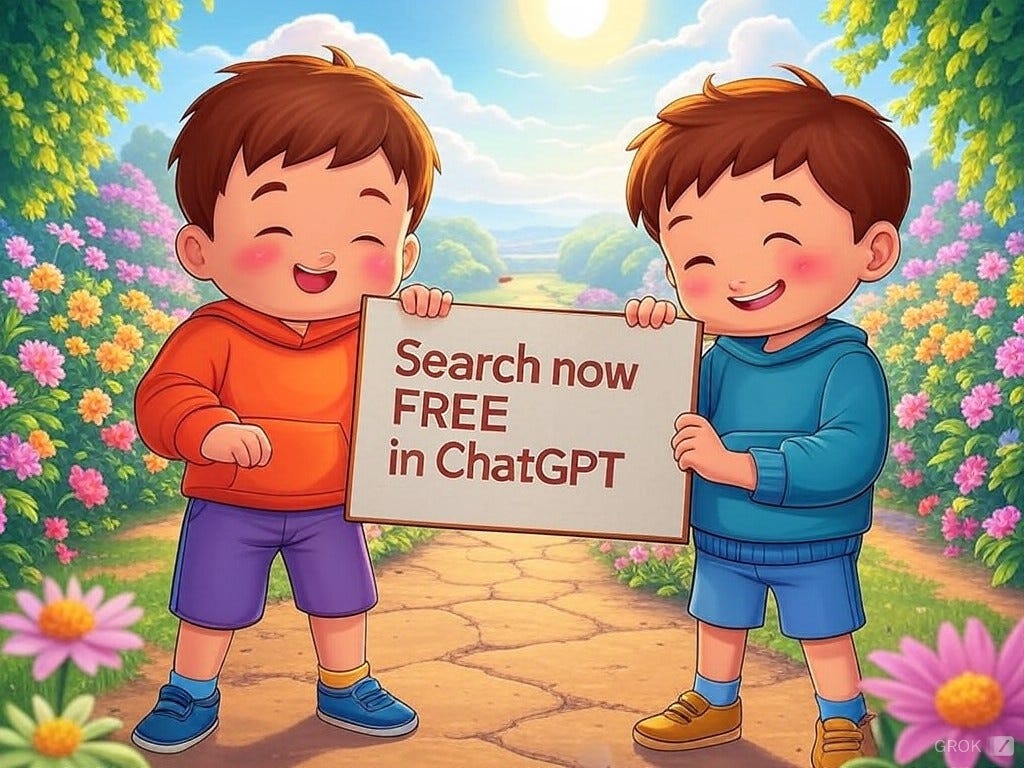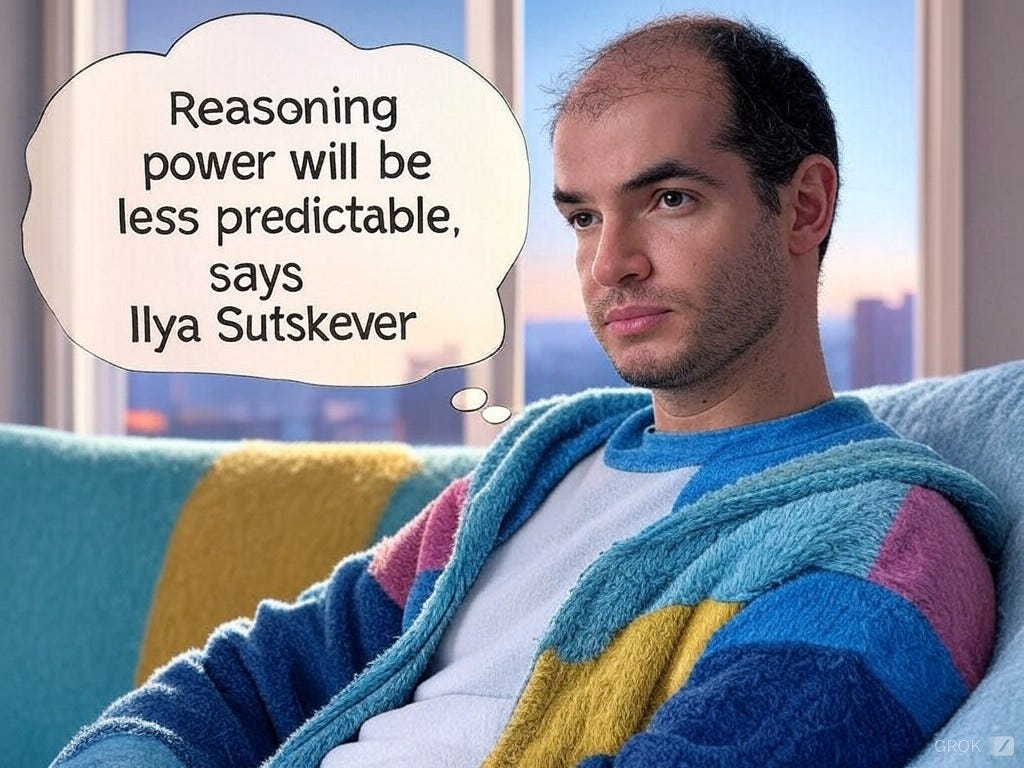ChatGPT Web Search now available for all logged-in Free users globally
ChatGPT opens search to free users while Google launches Veo 2 and Imagen 3, Meta releases multilingual models, Klarna cuts hiring through AI automation and Ilya Sutskever's lecture.
⚡In today’s Edition (16-Dec-2024):
🌐 ChatGPT Search now available for all logged-in Free users globally
🎥 Google launches Veo 2, its state-of-the-art video generation model which produces realistic, high-quality clips from text or image prompts
📡 Klarna’s CEO says it stopped hiring thanks to AI
🗞️ Byte-Size Brief:
Google releases Imagen 3 delivering photorealistic, artistic outputs with enhanced prompt understanding
Meta launches Large Concept Models processing sentence-level embeddings for multilingual optimization
ByteDance researcher compromises NeurIPS competitors causing $1.1M GPU sabotage damage
Higgsfield AI introduces ReelMagic enabling end-to-end text-to-video generation pipeline
🧑🏫 Top Lecture Roundup:
AI with reasoning power will be less predictable, and AI hits internet data ceiling - Says Ilya Sutskever
🌐 ChatGPT Web Search now available for all logged-in Free users globally
🎯 The Brief
OpenAI expands ChatGPT search to all logged-in free users globally, introduces voice search integration, and implements performance improvements across platforms.
⚙️ The Details
→ The update delivers faster search performance, enhanced mobile experience, and native maps integration. Users can activate search through direct queries or using the dedicated search icon.
→ The system features a conversational search experience that maintains context throughout interactions. New mobile features include rich visual listings, business information, and integrated Apple Maps functionality.
→ Voice search capability enables users to access real-time web information through natural conversations in advanced voice mode. The platform supports multiple language interactions and provides location-specific information with visual support.
→ Search requires users to have a free account and be logged in, providing higher rate limits and access to premium features like Canvas.
⚡ The Impact
Integration of real-time search with conversational AI enhances user experience across mobile and desktop platforms.
🎥 Google launches Veo 2, its state-of-the-art video generation model which produces realistic, high-quality clips from text or image prompts
The Brief
Google DeepMind launches Veo 2 and Imagen 3, featuring significant improvements in video and image generation capabilities. Veo 2 achieves 4K resolution video generation with extended duration up to minutes, while Imagen 3 delivers enhanced image composition across diverse artistic styles. Provides better understanding of real-world physics & movement. You can join the waitlist on VideoFX.
⚙️ The Details
→ Veo 2 demonstrates sophisticated understanding of real-world physics and human movements. The model responds intelligently to specific cinematographic requirements, from tracking shots to lens choices like 18mm for wide angles.
→ The system shows marked improvement in reducing hallucinations - fewer instances of extra fingers or unexpected objects in generated videos, significantly enhancing output realism.
→ All generated content includes invisible SynthID watermarks for AI identification, addressing potential misuse concerns.
→ Imagen 3 excels in generating images across multiple styles - from photorealism to impressionism and anime, with improved prompt following and detail rendering.
→ The technology is being deployed through VideoFX, ImageFX, YouTube Shorts, and Vertex AI, with ImageFX rolling out to over 100 countries.
⚡ The Impact
Advanced AI video generation with professional cinematography capabilities transforms creative workflows across multiple industries.
📡Klarna’s CEO says it stopped hiring thanks to AI
🎯 The Brief
Klarna halts hiring and leverages AI efficiency, reducing workforce from 4,500 to 3,500 while their AI assistant performs work equivalent to 700 customer service agents. The CEO says "Productivity will be limitless, and AI can already do all of the jobs that we as humans do"
⚙️ The Details
→ Klarna CEO Sebastian Siemiatkowski revealed the company's strategic shift towards AI-driven operations. Their internal AI assistant handles 2.3 million conversations, managing two-thirds of customer service interactions.
→ Despite claims of a complete hiring freeze, Klarna maintains 50+ open positions globally, primarily in engineering. The company clarifies they're "backfilling essential roles" rather than expanding workforce.
→ The fintech company plans to redistribute AI-driven efficiency gains through increased employee salaries. Currently, they have 200 employees who actively use AI in their core work functions to scale productivity.
→ With 85 million customers worldwide and processing $120 billion in card interest, Klarna positions itself for potential IPO at an estimated $20 billion valuation.
⚡ The Impact
It’s also worth pointing out that Klarna is looking to IPO soon. So, Siemiatkowski, the CEO of Klarna could be trying to convince investors that his company is aggressively incorporating generative AI into its workflows and that the benefits are already showing up.
🗞️ Byte-Size Brief
Google announed the enhanced Imagen 3 turns your words into exact pictures, from realistic photos to fantasy art. The updated system shows significant improvement in understanding complex visual instructions, producing more vibrant images with better composition across multiple artistic disciplines.
Meta's new AI understands complete thoughts instead of processing one word at a time. Releases a brilliant research, Large Concept Models (LCM). LCMs operate on sentence-level embeddings rather than words, enabling seamless multilingual and multimodal processing.". The system uses high-dimensional concept spaces to handle multiple languages and formats, while reducing computational costs and improving long-form content generation through hierarchical processing.
According to reports, The winner of the NeurIPS 2024 Best Paper Award sabotaged the other teams. The ByteDance researcher sabotaged colleagues' AI projects while developing his NeurIPS award-winning paper on image generation. He modified PyTorch code, corrupted model weights, and created backdoors to hijack GPU resources, causing $1.1M in damages and undermining research integrity.
Higgsfield AI has introduced ReelMagic, a new multi-agent platform that can generate long-form video from simple text prompts. It promises to transform story ideas into watchable videos, featuring customizable characters and consistent storylines. All within a single workflow.
👨🔧 Top Lecture Roundup
AI with reasoning power will be less predictable, and also AI hits internet data ceiling - Says Ilya Sutskever
Former OpenAI chief scientist Ilya Sutskever, one of the biggest names in artificial intelligence, had a prediction to make on Friday: reasoning capabilities will make technology far less predictable. Sutskever declared before thousands of attendees at the NeurIPS conference in Vancouver. Where he was accepting a "Test Of Time" award for his 2014 paper.
🤖 Key Highlights of his speech
→ Ilya Sutskever declared AI's current pre-training paradigm faces data limitations since "we have but one internet", despite growing compute power.
→ Current AI development hit critical constraints - while computational power keeps increasing through hardware/algorithm improvements, training data availability becomes the bottleneck due to finite internet content.
→ Data bottleneck will require new approaches. Sutskever outlines synthetic data generation and improved answer evaluation as potential solutions to overcome internet data limitations.
→ Future AI agents will achieve deeper understanding and self-awareness, moving beyond current pattern matching to true reasoning.
→ Complex reasoning introduces inherent unpredictability. As AI systems reason through millions of possibilities, their decisions become less predictable - similar to how top chess AI moves surprise grandmasters.
🎯 Industry Implications
→ Need for novel training approaches beyond traditional pre-training on internet data. This opens opportunities for synthetic data generation and improved evaluation methods.
→ Industry must prepare for less predictable AI systems. As models gain reasoning capabilities, their decision processes will become more complex and harder to interpret.
→ Self-awareness and deeper understanding capabilities will fundamentally change AI applications. This enables more sophisticated AI agents but requires new safety considerations.





